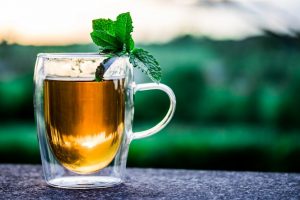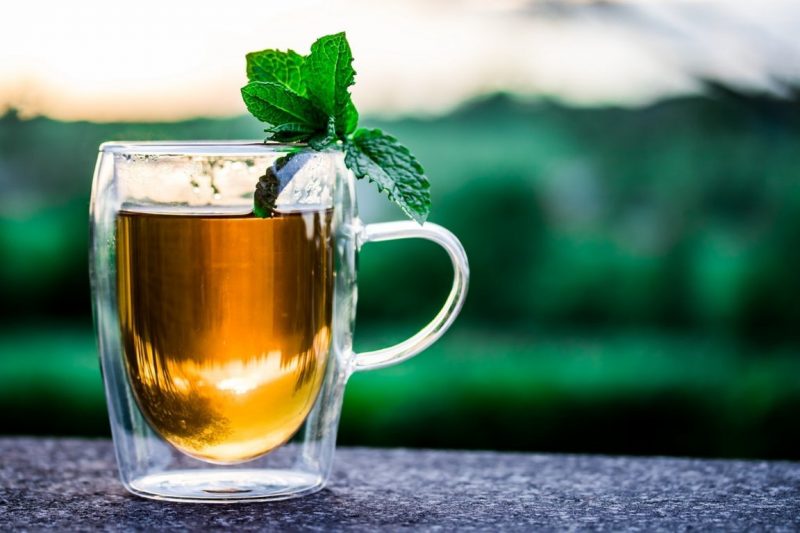 Tea is one of the most comforting hot drinks.
Tea is one of the most comforting hot drinks.
Whether you enjoy a warm cup in the winter while bundled up under a blanket by the fireplace or simply for its medicinal properties, consuming high-quality tea is a must.
But how do you know what tea is high-quality?
Is there really even that much of a difference? You bet there is.
Just like any other food that is grown, tea leaves are typically treated with some form of pesticide in order to keep bugs away.
Unfortunately, what you’re not told is that those pesticides are not even washed off of the tea leaves before they are bagged! GROSS.
Pesticides are literally bagged with your tea leaves and steeped in your hot water.
Would you like a steaming hot cup of carcinogens? No thanks.
Some guilty brands…
Here are some examples of popular brands that have been tested and shown to contain cancerous pesticides:
According to one report published in 2013, a whopping 91% of Celestial Seasonings tea tested positive for pesticide residue that exceeds the U.S. limits.
It claims that their Sleepytime Kids Goodnight Grape Herbal tea contains propachlor, a known carcinogen that has no safe harbor limit under California’s Proposition 65.
This same report indicated that the “Wellness” line of these teas also contain a known developmental and carcinogenic toxin called Propargite.
Apparently, the FDA has even issued two warning letters to Celestial Seasonings referencing their quality control.
While all of this is alarming, it is important to note the fact that the company who wrote this report, Glaucus Research Group, is a “short seller” that bet against the “mother” company of Celestial Seasonings.
This means that they would benefit from a decline in that company’s stock.
This indicates a bias that Glaucus Research Group acknowledges in the report.
Shortly after Glaucus Research Group wrote this report, Celestial Seasonings responded here.
Teavana, another well-known, high-end tea company, was also targeted in the same study.
Glaucus Research found that 100% of Teavana’s supposedly pesticide-free teas contained multiple pesticides.
They state that the most expensive Teavana tea was actually the worst offender, testing positive for 23 pesticides.
Not only were pesticides found, but some of their teas contain “artificial flavoring”—these could include ingredients originating from crude oil and coal tar.
Teavana claimed that the report produced by Glaucus Research was bogus, but it was difficult to find any actual statement on their website that was specific or offered any real, not vague response.
Other popular teas will include “natural flavors” as part of their ingredients.
The problem with this is that these ingredients may be derived from natural products, but by the time they are chemically broken down in a laboratory, they could be the same as some artificial flavors.
When you buy a brand that is not organic, you also risk consuming GMOs.
Some ingredients added into popular teas include soy lecithin and modified corn starch.
Ingredients aren’t the only thing that matter
Have you ever thought about the tea bags that also get steeped in the warm water?
Some of today’s tea bags are made from polylactic acid (PLA) which is a corn-based material that appeals to companies because of its biodegradability.
Unfortunately, they are most likely made with genetically modified corn, and because they are steeped in warm water, it is likely that some of the molecules leach into the water.
Two plastics commonly used for making tea bags are food grade nylon and polyethylene terephthalate (PET).
While these are considered to be some of the safest plastics in terms of their leaching potential, the molecules in these bags may break down when steeped in boiling water…which is exactly how tea is prepared.
While the plastic will not actually melt in your hot tea, harmful phthalates could be released according to a principle known as the “glass transition” (Tg) temperature.
To put it briefly, this is the temperature at which the molecules in certain materials begin to break down.
Both PET and food grade nylon have a Tg that is lower than the boiling point of water (212°F).
This means that the molecules in the tea bags will begin to break down in hot water.
Paper tea bags can be just as bad as, if not worse than, plastic ones.
Apparently, paper tea bags are treated with a potential carcinogen known as epichlorohydrin.
This chemical has been used as a pesticide, and when it comes in contact with water, has been shown to cause cancer, infertility and suppressed immune function in animals.
So what can you do?!
Clearly, the antioxidants and medicinal properties of teas won’t be of much use if the tea is contaminated with pesticides and other harmful substances that will leach into your tea water, so what can you do to avoid this?
The first thing is to purchase organic, non-GMO teas.
If you can find a tea vendor that you trust based on researching their product, or better yet, visiting their tea fields, that is the best option.
If not, researching their product and organization online can help you to determine the quality of their product.
Secondly, buying loose leaf tea and steeping it with a stainless steel or glass infuser will prevent the issue with plastic and paper tea bags.
Loose leaf tea also tends to contain a greater amount of antioxidants and flavonoids due to it being less processed than bagged teas.
If you do decide to buy a bagged tea, make sure it is fresh when you consume it!
You can determine a tea’s freshness by removing the tea from one of the bags, placing the empty tea bag in a cup of hot water and steeping it for three minutes.
If the water tastes like tea (even though only the bag was in the water), the tea is not fresh anymore as the flavor from the leaves has transferred into the bag.
Be aware of teas in restaurants. They are usually non-organic teas that likely contain high amounts of pesticides.
Finally, READ THE INGREDIENTS! Just because a box or bag of tea claims that its ingredients are “all natural” or are “healthy” does not mean this is the case.
It is important to know what the ingredients are in your tea so finding teas with only real foods listed as the ingredients is the best way to go.
Besides tea, up to 98% of our fresh food carries pesticides and they increase your risk of getting cancer.
To protect yourself from cancer, go to the next page and & learn how you can protect your body from these deadly toxins –
About the Author:
Emma Deangela is the best selling author of The Alkaline Diet Program and 80/20 Fat Loss. She has helped over tens of thousands of men and women to lose weight and transform their health with sound nutrition advice. Learn how you can lose weight fast – How to lose weight by adding these alkaline foods.
Do you like teas? What kind of tea and which brand of tea do you drink?
Please share with your friends this article on Tea – Use any of the social media and email buttons on the left of our website.


Leave a Reply